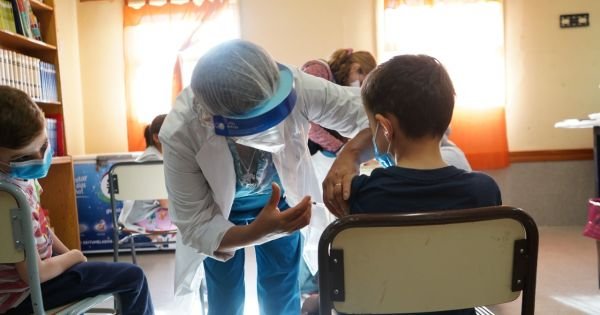[ad_1]
Covid 19: Sales of facemasks and alcohol gel on the rise in Argentina
There is a considerable number of positive cases in the pediatric age group in Argentina
Despite the ongoing economic crisis, a sharp increase in sales of facemasks (15%) and alcohol gel (10%) was reported amid a surge in Covid-19 detections, the Argentine Union of Pharmacists and Biochemists (SAFyB) said. In this scenario, federal health authorities have again recommended people update their vaccination scheme against the malady.
Infectiologist Silvia González Ayala told Noticias Argentinas that several factors contributed to the rise in the number of cases, the first one being non-compliance with the vaccination schedule. She argued that only a few people were vaccinated with the ambivalent booster, which is the one that should be administered because it provides a very broad protection.
She also pointed out that children, especially those under 12 years of age, were the ones less vaccinated while there was a considerable number of positive cases in the pediatric age group.
Another factor contributing to the increase in the number of cases is the concentration of people in closed places with poor ventilation, coupled with a drop in regular hand washing with water and soap.
Regarding facemasks, the expert stressed they should cover both mouth and nose and recommended using them in closed places with little ventilation. It would be a very prudent measure, she said.
Gonzalez Ayala criticized the amount of false information on the adverse effects of vaccines, considering it as a reason for people not to get vaccinated. He also mentioned that another reason is that people are no longer so afraid of the disease, as Covid is not associated with death as it was in the early days of the pandemic.
Chile
In Chile, an increase of nearly 75% in Covid-19 cases from last month was reported. Experts foresee that the trend will continue for a few more weeks. The new wave of mostly mild infections has had a very low impact on the country’s health system.
Between Jan. 14 and 20, there were 3,436 new confirmed infections, at a daily average of 491 cases, a 74.7% increase from the week of Dec. 10-16 when 1,966 infections were recorded (281 cases per day). The new figures are believed to stem from the appearance of the Pirola subvariant.
Most likely, cases will continue to increase a little bit. That is why the authorities call to get vaccinated against Covid-19 and influenza is so important and thus be prepared for the winter because in the northern hemisphere, there is a lot of coronavirus and this will be replicated in Chile, Luis Castillo, coordinator of the Critical Patient Unit of the Barros Luco Hospital, told La Tercera.
In recent weeks we have noticed an increase in consultations and we have also recorded some hospitalizations which generally correspond to patients who are in risk groups, i.e., those over 60 years of age with comorbidities, Sebastián Ugarte, head of the Critical Patient Unit at the Indisa Clinic noted.
Authorities have launched new appeals to the population to get vaccinated after a new campaign was launched in November for those over 60 years of age, immunocompromised patients, healthcare professionals, and people with chronic diseases.
Uruguay
As a new vaccination campaign was launched in Montevideo on Monday, Uruguay’s Health Ministry issued a report on the drug’s possible side effects. The document read that very rare cases of myocarditis and pericarditis were detected mainly in young men under 40 years of age, which evolved favorably unlike unvaccinated people who contracted Covid-19.
It is recommended to report adverse effects when they persist over time, interfere with daily activity, require an emergency medical consultation, or lead to hospitalization, the Uruguayan authorities stressed.
According to the Pan American Health Organization (PAHO), more than 330 million doses of vaccine using messenger RNA technology have been administered in the Americas.
[ad_2]
Source link




